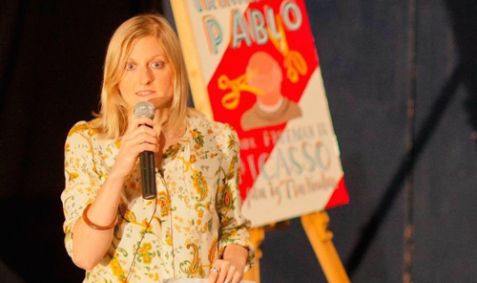Meet Charlotte Bonham-Carter, Course Leader for new course MA Arts and Cultural Enterprise. With a background in cultural management and academic leadership, Charlotte tells us why this course is important, the benefits of distance learning and the perks of having a career in arts and cultural management.
Why do you think MA Arts and Cultural Enterprise is necessary?
The course responds to a growing need for multi-skilled individuals who can not only generate ideas for original arts and cultural events, but who also possess the practical and business skills necessary to make these ideas happen.
There are many opportunities for work and entrepreneurship within the cultural economy which contributes £7.7bn to the UK economy an increase of 36% since 2011. Current conditions require individuals who can manage complex projects, often with multiple stakeholders. As a practitioner today you may need to talk to an artist about her work in the morning and then discuss the value of that work with a corporate sponsor in the afternoon. The course equips students with multiple vocabularies, and underpins the importance of bringing creativity to the management process.
What changes in exhibitions/cultural events have you experienced in your career?
The course acknowledges that producing cultural exhibitions, events and interventions is no longer about transporting a crate of artworks from one side of the world to the other. Artworks are often time-based, socially-engaged, performative or interactive. As a cultural producer, you might be assembling hundreds of volunteers, working with disadvantaged participants or staging a 24-hour cooking performance.
As an arts manager, I’ve been involved in all of these things – and many other unexpected scenarios! Working in this way requires a flexible, responsive approach. The course is about acknowledging the complexity of current conditions, including precarious funding situations, new technologies and innovations in creative practice. It is also about understanding the role of culture in the economy and in society.
Why is being able to study via distance learning on the course so attractive?
The course is low residency and combines online teaching with several face-to-face teaching weekends. I think it’s exciting that the course operates in this way, because in many ways, the pedagogical delivery mirrors the kinds of ambitious projects we expect our students to go on to be involved in.
The delivery model acknowledges that people are studying in different ways – they might be returning to education after a period of work or raising a family, or using the degree to career change. With the technologies available to us, it is no longer a requirement to learn by being in the same physical location, day in and day out. In offering the course in this way, we are helping our students to build international networks with colleagues who may be working around Britain, or possibly the world. We are enabling them to take a more flexible approach to learning and we are harnessing the potential of technology to do all this. I’m excited that the experience of studying on the degree so perfectly matches the ways in which we expect our students will go on to work.
What were the most valuable lessons you learnt in your career?
I’ve worked as a producer and a curator in a number of different places including the Barbican, the ICA and Art on the Underground. What I learnt in these different positions is the importance of creativity in the management process.
As a cultural producer, you are often involved in realising something in which the outcome is uncertain. You are often trying to do something that is unusual, in an unusual place. As a result, you must always have another idea about how things can be done, or another argument about why it can and should be done. For this reason, I think cultural workers have a great deal to offer outside the cultural sector, and why so much innovation is borne, initially, from within the cultural sector.
More:


